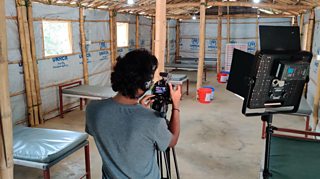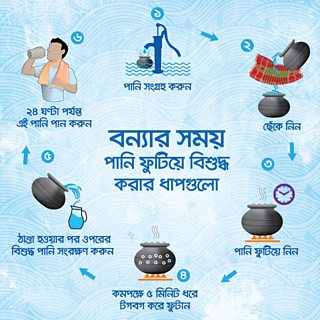Preparing for Cyclone Amphan in the COVID-19 pandemic
Richard Lace
Country Director, 主播大秀 Media Action Bangladesh
Tagged with:

A 主播大秀 Media Action cameraman films in a COVID-19 isolation centre in Cox's Bazar, Bangladesh. Photo by Khandokar Hasanul Banna, 主播大秀 Media Action
Nearly a million Rohingya people still live in refugee camps in Cox’s Bazar, Bangladesh. Having survived terrible violence, they now face the dual threats of the first confirmed cases of COVID-19, and flooding and landslides from Cyclone Amphan. Here is how 主播大秀 Media Action is helping people prepare and cope.
Bangladesh is well-versed in cyclone preparation – but preparing for a cyclone in a time of global pandemic is something that perhaps no one in living memory has done before.
Cyclone Amphan has not hit Cox’s Bazar directly, but the camps have still been affected by high winds, heavy rain and flooding. And across Bangladesh, the choices have been stark: evacuate an estimated 2 million people in coastal areas into crowded shelters and risk spreading COVID-19, or continue strict physical distancing and risk more people dying in this enormous storm.
主播大秀 Media Action’s work on preparing for natural threats like cyclones in Bangladesh dates back to 2013. We work closely with government and other agencies, using media and communication to ensure our audiences understand what to do, where to go and how to seek help before, during and after a cyclone.
In coastal areas, people are well-versed in evacuation procedures thanks in part to trusted information carried on local media – it is information that has saved lives.
But because of COVID-19, our team has had to move quickly to redesign procedures and advice to reflect the additional threats posed by the virus, and then to ensure these are communicated to people clearly so that they understand and adapt accordingly.

An infographic demonstrates how to filter and boil water so it is safe for drinking. Credit: 主播大秀 Media Action
In the aftermath of a cyclone, people need access to clean water – often requiring purification drops or tablets – as well as food, sanitation, emergency shelter and medical help. All of these procedures and practices now need to be adapted to the risk of COVID-19, so that we don’t advise people to do anything that might be harmful.
In Cox’s Bazar, with the first few cases of COVID-19 now confirmed, people are already worried. Our teams have been working hard to explain the concepts of isolation and quarantine – to show what’s inside an isolation centre, for instance, and to talk to doctors and health-care workers so that the idea of seeking medical help is less frightening. to find out their concerns, and share these across other humanitarian agencies so they can respond and adapt to community needs.
At the same time, we’re providing information in local language about what emergency cyclone warnings mean, where and how to evacuate, and critical survival information – including water purification, hygiene practices, and avoiding waterborne diseases.
We’ve also supported health workers by producing easy to understand videos on hygiene practices in health settings and how to safely use PPE.
These are incredibly challenging times in which to work, especially when our staff are facing movement restrictions and their own challenges in keeping safe and healthy.
We’ve adapted the way we work and deliver our programming, delivering much of our support to the humanitarian sector in online sessions – covering solutions for how NGOs can continue to communicate and respond with the Rohingya population amid physical distancing restrictions.
Every second counts in a crisis. Experience and expertise in local contexts and cultures, and strong relationships with donors, NGOs, local governments and communities themselves, make all the difference in moving quickly to save lives with trusted information.
--
Richard Lace is the Country Director for 主播大秀 Media Action Bangladesh.
主播大秀 Media Action has been working on COVID-19 response in Bangladesh, including Cox’s Bazar, with the support of H2H, funded through the Department for International Development.
Our work in Cox’s Bazar, where we work with Translators Without Borders and Ground Truth Solutions, is funded through EU Humanitarian Aid in partnership with Action Against Hunger; DFID through UNOPS, and UNHCR.
